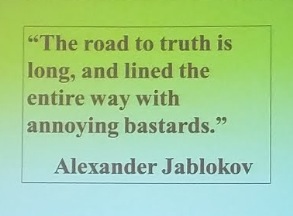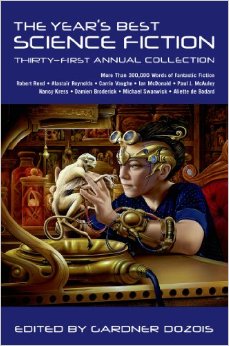The germ of the idea for Timeslip (or whatever--as I've mentioned, I'm trying to come up with a better title) came to me while I was a participant at the Rio Hondo workshop in the hills above Taos, NM in May of 2010. Several other people had submitted sections of YA novels, and I thought "hey, maybe I can do that!"
I got up early one morning and drove off to take a hike by myself. As I walked, the character and basic structure of the book came to me. By the time I ran into too much snow to keep going, I had enough to get me started: my main character Doug, his father, and the device his father has invented to get into other worlds with other histories, the device that brings someone from one of those other worlds into ours, and gets Dad kidnapped.
Later that year, my family and I spent a week in the Adirondacks. Every morning I got up early and did experiments with the book. That's the way I get through the initial planning of a novel. I pick some possibility and examine its implications, and its downstream consequences. I wouldn't say that's an efficient way to do it, but I don't have the gift of distinguishing fruitful possibilities from sterile ones. I have to take each one out for a fairly extensive test drive. I sat out on the porch, feeling the light grow over Long Lake while the family slept, and scribbled in what is now the first of a thick series of notebooks lined up near the desk where I write this.
The first draft went fairly quickly, by my standards, and I had it done by September of 2011. Why, then, did I only manage to turn the thing in in September 2013?
Partly, it's because I'm an idiot. Or, to put in a way that is both nicer and more accurate, I have an "uneven cognitive profile" -- #6 in this quick essay on procrastination, by an online advice-giver, Dr. Alice Boyes, whom I've really gotten useful advice from. In many situations, my cognitive strengths allow me to skip over the things I don't do well. But a novel, or a really busy job (as I have right now), sometimes exposes very real blindspots that I need deal with. Let's call that my UCP problem. Finding a way to detect the blindspots before they cause real problems is the main task of my self-analysis.
And partly it is that fact that I do work full time, at a job that requires a lot from me, and am my family's main financial support. But that might account for one year of the delay, not two.
Despite my best "fruitful alternative" planning, I often end up in a narrative dead end. I'm not particularly adept at working out complex plots with lots of competing parties, and yet, those are the plots I tend to favor. Why not an entertaining picaresque, where one thing happens after another, and aside from a few coincidental meetings with characters from earlier in the narrative, there is no plot to speak of? I dunno. The inspirations for those just don't seem to come to me.
So I ended up stuck several times, and had to work my way back out. I rewrote it, gave it to the Cambridge SF Workshop a year ago, and they gave me some useful advice. Then, as often happens, I had too much to think about and fumbled and procrastinated. Was that wasted time, or useful gestation? Some of both. I did get a much stronger last third as a result. Still shouldn't have taken so long.
On the topic of novel revision, the best advice I've found anywhere comes from writer Holly Lisle: her blog post How to Revise a Novel. Her ruthless scene-by-scene analysis really brings every problem out into the open. Now that I have incorporated her advice into my practice, I'm hoping it will percolate back into the actual scene construction, making the book "revision ready" in the first draft.
As I said, I'm hoping.
But, you know what? I like this book a lot. I read every word while proofreading and line-editing this last time, and actually felt good about it. That's rare. Writing a younger protagonist, and striving for simpler language, forced me away from my love of imagery, background information, and complex language and into a sparer, more dramatic style. I'm not giving any of those up, by the way. But I hope that when I revisit them in another book, I can use them because I want to, not because I need to in order to make up for other deficiencies.
It's Sunday morning. I want to write a few stories before I start my next book. So, I will press "publish", get another cup of coffee, and get to it.



